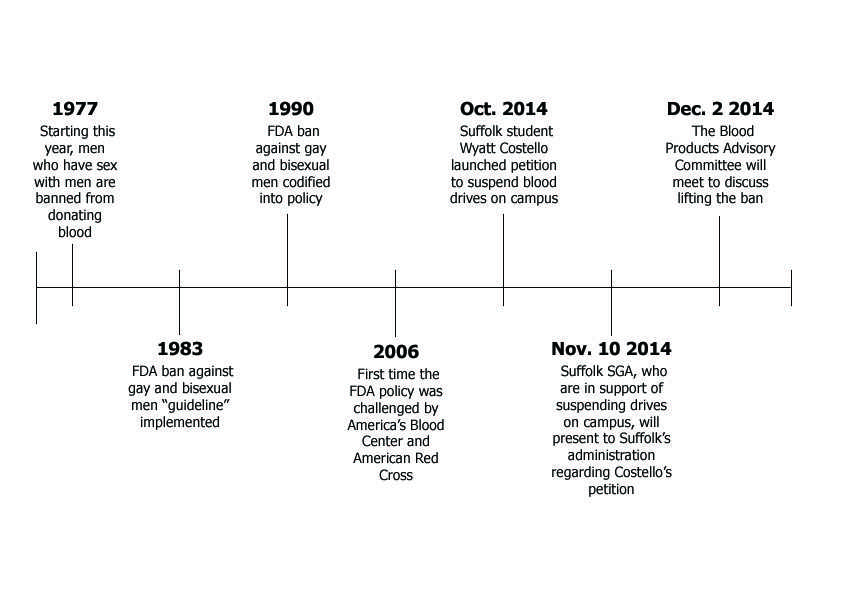By Abbey Wilson
It took a few moments to get everyone settled down. Students and faculty were in Donahue to participate in a discussion on the lifetime ban on gay and bisexual men donating blood.
Bill M. Jesdale, a professor at the University of Massachusetts Medical School, and AIDS activist since the early 1980s, opened the discussion by talking about the origin of the AIDS epidemic in the U.S. which began around the same time.
Jesdale said that the ban on donating blood specifically states that men cannot donate if they have had sex with another man, even once, since 1977.
Jesdale said he believes the law is discriminatory against gay and bisexual men. When asked if the difficulties they had in the 1980s were discriminatory in nature, he said, “Maybe it wasn’t homophobia, but it certainly smelled like it.”
Meanwhile, Wyatt Costello, a Suffolk University student, has begun a campaign to temporarily suspend blood drives on campus for the same reasons Jesdale spoke of last Thursday.
SGA, who has backed Wyatt’s petition was present at the event. Jesdale said that several countries, including Canada and Australia, have a one- to five-year deferral period for men who have sex with men to donate blood. This means that they have to wait for that period of time before they are allowed to donate. Jesdale said that in Italy, the doctors talk to the patient personally before deciding what to do on a case-by-case basis.
This ban is not a law, it is a policy, according to the U.S. Food and Drug Administration’s website. According the FDA’s website, The Blood Products Advisory Committee, or BPAC, is having a meeting to discuss lifting the ban on Dec. 2. The American Medical Association has publicly declared that it does not support this ban, but that it supports deferral periods “that are fairly and consistently applied to donors according to their level of risk,” according to its website. The American Red Cross and The American Association of Blood Banks have also said that they do not support the ban.
During the discussion, Jesdale had everyone in the room turn to someone they did not know and ask them what they could do to lift the ban, what Suffolk could do to lift the ban, and what the pros and cons of alternative approaches are. A student said that the administration should be more present at events such as these. Jesdale then discussed the BPAC meeting and suggested that audience members could call or email the committee, telling them to change the ban.
One idea generally agreed on is that the current testing process is not enough. Currently, the process is a detailed questionnaire given to all potential donors. Jesdale said that it is not effective because anyone can lie on the questionnaire and it can be considered discriminatory. If they decide that you are eligible after the questionnaire, they take a small sample of your blood and test it. The problem with that, according to Jesdale, is that once your blood is outside of your body, it will continue to test negative, even if you do have HIV.
Jesdale encouraged audience members to carry out their ideas and to contact the committee, and directed them to the Food and Drug Administration’s website for more information.
The discussion was hosted by the Office of Diversity Services and co-sponsored by Rainbow Alliance.













